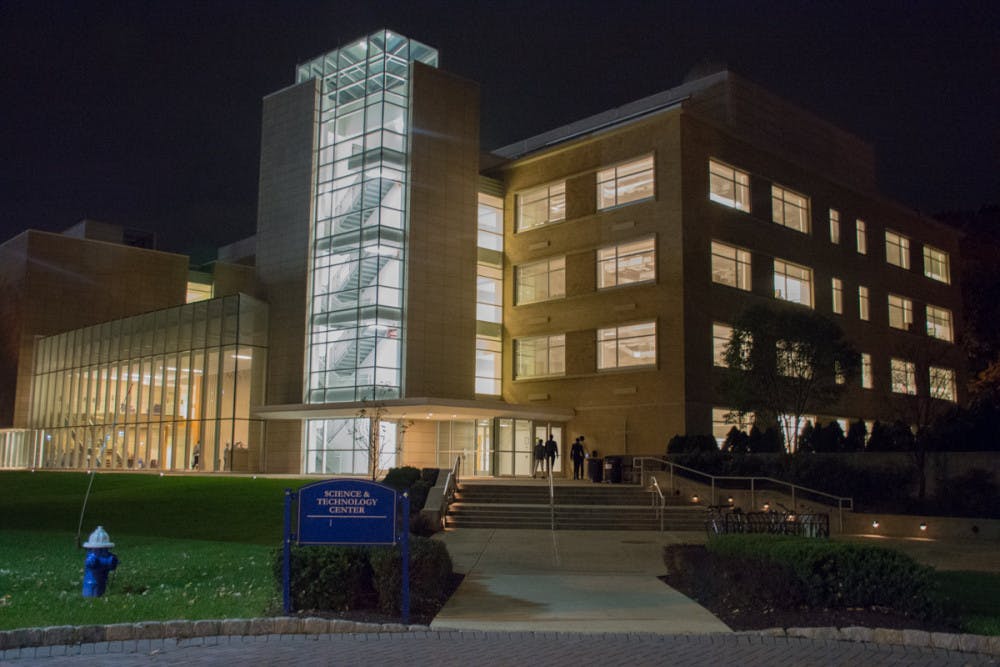A cancer immunotherapy research project has been in development at Seton Hall under the leadership of Dr. David Sabatino, associate professor in the Department of Chemistry and Biochemistry.
Marianna Philips Ph.D., a recent graduate student, laid the ground work for the project. This innovative research has led to a federally funded grant awarded by the National Institute of Health (NIH) under the umbrella of the National Cancer Institute. This grant awarded $100,000 over a two-year time span. The money for this research is given to cover direct costs related to research and personnel.
[caption id="attachment_20498" align="aligncenter" width="838"] SHU grad students receive grant for cancer research.
SHU grad students receive grant for cancer research.
Sarah Yenesel/Asst. Photography Editor[/caption]
Research for the project is in partnership with Hackensack University Medical Center, with whom Seton Hall is launching its medical school with in fall 2018.
“The affiliation that SHU and Hackensack have created will help to develop a school of medicine that has a cutting edge research program, leading to a productive start,” Sabatino said.
The project team consists of three principal investigators: Sabatino, Constantine Bitsaktsis, associate professor in the Department of Biological Sciences with an expertise in immunology, and Dr. Robert Korngold, research chair at John Theurer cancer center at Hackensack UMC.
Under the supervision of these three principal investigators are first year Ph.D. student Rachel Montel and second year student in the master’s of biology program Keith Smith who are at the forefront of the research. By the time Montel and Smith joined the project, Sabatino and former students had already published a research article and submitted an application for the grant approved this summer.
Montel and Keith are new additions but “have been off to a productive start since their beginnings,” Sabatino said.
Montel shared her experience thus far working with the SHU faculty members.
“Both of Dr. Sabatino and Professor Bitsaktsis are very skilled in their respective fields and have been very helpful in this research,” Montel said.
For many years cancer has been treated with chemotherapy and radiation, however, the team has chosen to focus on cancer immunotherapy which is a type of therapy that stimulates the immune system on its own.
“This current method is harsh and inadvertently kills healthy cells,” Biksaktsis said. “However, with immunotherapy it is a therapeutic approach that utilizes the immune cell and is specifically directed against the cancer.”
According to Sabatino, their research consists of synthesizing a molecule named GRP78. This molecule is also named a synthetic antibody mimic because of its purpose to act similarly to that of an antibody found in human cells. The synthetic molcule is meant to link natural killer cells in the body to cells found on the surface of liver cancer cells, named GRP73 which help scientists to characterize cancer cells.
The team has chosen to focus on liver cancer cells because of a previous model that has already been well-researched and showed good expression levels of GRP73 at the surface. The synthesizing of this molecule is being conducted on campus at Seton Hall. Biksaktsis is helping with cell culture in immune cells, more specifically natural killer cells (NK cells). He is also testing the molecules to see if they activate and combine the NK cells to have a killing response toward their target.
The latter part of the research is being conducted at Hackensack Medical Center. Montel is working closely with Korngold to test the synthesized molecule’s activity and to progress the research from pre-clinical to clinical studies. Korngold and Montel are working primarily with liver cancer cell models being cultured in the lab, both in cells and in vivo to determine what type of activity their molecule had targeting and killing cancer cells and tumors. Once they have the right safety profiles and efficacy they will begin clinical trials in humans.
This research is considered innovative by Sabatino in regards to the current immunotherapy research. These current methods use monoclonal antibodies, which bind to cancer cell receptors to block activity cancer cell activity. However, these antibodies have limitations such as difficulty to make, costly process and difficult administration.
The research done at Seton Hall addresses some of these limitations. The peptides synthesized are much smaller making them easier to administer, less costly to make and the researchers are able to make an abundance through the use of machines.
“Our research builds upon the current technology and primarily aims to address limitations in current methods,” Sabatino said. “We are looking at trying to address these more complex strategies to make available to a wide range of people regardless of socioeconomic background.”
At the end of two years of the project, Smith hopes to have a paper published on the research and presentable data to continue their research in vivo. Montel hopes to continue her work in the research field and to see this research reach the shelves of pharmaceuticals.
Sabatino said his ideal outcome of this project at the end of its two year funding cycle is “to be able to set out and prove experimentally the research objectives outlined and to be in a position to apply for bigger grant from NIH.”
Vanessa Vela can be reached at vanessa.vela@student.shu.edu.

Comments




